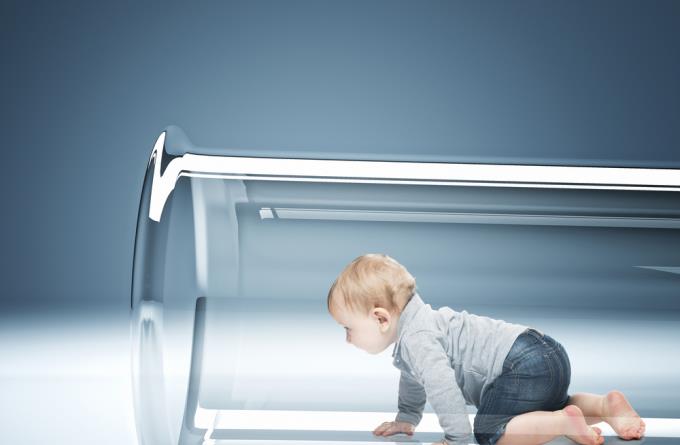Although endometriosis makes it difficult to have children, there is hope for these patients. If you want to have a baby, you must undergo treatment or implement solutions such as artificial insemination, in vitro fertilization ...
About 1/2 of women with endometriosis will have difficulty getting pregnant. The quick good news depends on other factors such as the husband's age, fertility, and the degree of endometriosis. For couples wishing to have a baby and a wife with endometriosis, surgery or methods such as in vitro fertilization can be the solution.
Endometriosis and infertility
A post-diagnosis of endometriosis is of concern for many women is its effect on pregnancy plans. It's not easy to tell if a person may be infertile (not able to conceive after a year) and statistics on how many women with endometriosis actually affect fertility production is also very diverse.
According to research published in the Journal of Reproductive Support and Genetics, it is estimated that 30-50% of women with endometriosis will suffer from infertility. Although women with infertility are sometimes not formally diagnosed with endometriosis, it is still possible to develop the disease. Some studies have found that infertile women are at risk of endometriosis 6-8 times higher than normal people.
In addition, a quarter of the couple was diagnosed with infertility of an unknown cause, and doctors suspect some of them may be dealing with mild endometriosis. This is demonstrated in the above study that up to 20-25% of women with endometriosis have no symptoms at all.
Endometriosis can only be definitively diagnosed by endoscopy, so some cases of infertility are considered to be of unknown cause.
A natural chance of getting pregnant with endometriosis
If you know you have endometriosis, before you are going to become pregnant, you should see your doctor and consult your doctor about your condition.
Usually, your doctor will recommend a spontaneous pregnancy for 6 months (instead of 12 months). If the results are not as expected, see a fertility specialist.
People as young as 35 may not have much time to wait for natural conception. A woman's natural fertility will gradually decrease, especially after the age of 35 , plus endometriosis, so it's not a good idea to wait.
Pain caused by endometriosis and infertility

Pain can interfere with fertility because it makes sex less comfortable. Pain doesn't affect your ability to ovulate or conceive, but it does interfere with sex.
The pain is not necessarily related to the severity of endometriosis. Although severe endometriosis can aggravate pain, mild endometriosis can also cause severe pain. This depends on the implant site of the endometrium.
A person with a lot of pain doesn't mean it's harder to get pregnant than someone with less pain. Women with endometriosis are often given birth control pills to relieve pain symptoms. Of course, you can get pregnant only if you stop taking the drug.
In the case of moderate to severe endometriosis, you will sometimes need surgery to remove the endometriosis or cysts. Surgery can relieve pain, but repeated surgery can cause a buildup of scar tissue (adhesion) increasing the risk of infertility.
In very severe endometriosis, the uterus, ovaries or part of the ovary may be removed. This will affect fertility in the future. You must also know that having a surgical removal of your reproductive organs is not a cure for endometriosis because the pain is likely to return. So, before having surgery, ask the surgeon to advise on planning to have a baby in the future.
Potential cause of infertility when endometriosis is lost
Currently, experts still do not fully understand how endometriosis affects fertility. Although it is known that endometriosis can cause ovarian cysts (which can interfere with ovulation) or scar tissue from endometriosis that obstructs the fallopian tubes, the cause of infertility remains unclear.
However, cases of endometriosis without endometriosis or fallopian tube obstruction can still experience impaired fertility. There are several theories that could explain why endometriosis makes getting pregnant more difficult:
1. Obstructed or deformed reproductive organs
Damage to the endometrium can cause scar tissue, also known as adhesion. These adhesions can interfere with reproductive organs. They even cause the fallopian tubes to block, preventing eggs and sperm from meeting each other.
2. Total inflammation
The increased inflammation in the body seems to be related to infertility, as women with endometriosis also experience various inflammatory diseases.
So, endometriosis causes inflammation, or inflammation increases endometriosis? Is this related to infertility? Currently unknown.
3. Problems with embryo implantation
Although endometriosis is a condition that causes endometrial-like tissues to grow outside the uterus, it can also affect the endometrium itself. The rate of embryo implantation success in women with endometriosis is often lower but is still likely related to poor quality eggs.
Several studies of in vitro fertilization have found that women with endometriosis using donated eggs have a similar rate of implantation success than women who do not have endometriosis.
4. The quality of eggs is reduced
Women with endometriosis sometimes experience poor egg quality. Furthermore, embryos from these people would also develop more slowly than average. When an egg donor has endometriosis and the eggs are used for a woman without endometriosis, the embryo produced is of lower quality and the rate of successful implantation is not high.
Stages of endometriosis and infertility

Your doctor may have mentioned to you the stages of endometriosis. During surgery, your doctor will look at the location, amount, and depth of endometriosis to staging endometriosis.
There are four stages, rated for severity, with stage 1 of mild endometriosis and progression to stage 4 being severe. Endometriosis people in stage 1 or 2 are less likely to develop infertility than people in stages 3 and 4.
Staging endometriosis can also help your doctor come up with a treatment plan. For example, a woman with stage 2 endometriosis can conceive the natural method, but in the case of stage 3, you should go for in vitro fertilization.
However, endometriosis cannot predict whether fertility treatments will be more or less successful. Stage 2 endometriosis may still experience multiple failed in vitro fertilization attempts. In contrast, stage 4 endometriosis is still able to conceive within the first cycle of treatment.
The treatments
The most effective cyclic treatment for endometriosis infertility will depend on age, stage of the disease, infertility risk factors, cost of treatment and individual choice. .
The treatment plan is also based on the stage you are in and whether endometriosis is the cause of infertility, with an age perspective.
Pumping sperm into the uterus (IUI)
Fertility drugs alone are often not used in women with endometriosis because the likelihood of improvement is low. Fertility drugs include Clomid (clomiphene) and gonadotropin. Clomid medication and the injection of sperm into the uterus is often the first trial to avoid the risk of multiple pregnancies and ovarian hyperstimulation syndrome (OHSS) .
In a study of women with unexplained infertility or who had undergone endometriosis surgery, the pregnancy rate per cycle was 9.5% for clomid users with IUI. As for women who choose to get pregnant naturally, the number just stops at 3.3%.
A randomized trial of 49 women with stage 1 or 2 endometriosis compared the pregnancy rate in those who took 3 cycles of gonadotropin combined with IUI with those for a natural pregnancy without application. What form of fertility support in 6 months. As a result, the pregnancy-per-cycle rate of those taking gonadotropin in combination with IUI was 15%. As for the group of untreated women, the pregnancy rate per cycle only stopped at 4.5%.
In vitro fertilization (IVF)

If the pregnancy enhancer and the method of injecting sperm into the uterus are unsuccessful, in vitro fertilization (IVF) may be the next step. In vitro fertilization (IVF) is considered to be the most effective overall. This method is also quite expensive and invasive.
Depending on the circumstances, in vitro fertilization (IVF) may be the first-line treatment for decreased fertility. You will be advised to skip the injection of sperm into the uterus and go straight to IVF if:
Over 35 years old
Have stage 3 or 4 endometriosis
Never mind the cost of in vitro fertilization or invasive procedures
There are many risk factors for infertility (like problematic sperm or low ovarian reserve)
According to studies, the average success rate of IVF for endometriosis cases is about 22.2%, slightly lower than that of IVF in normal women.
Predicting the success rates of each case can be tricky. Most couples have to opt for in vitro fertilization while also facing risk factors for fertility other than endometriosis.
However, if endometriosis is the cause of infertility, the rate of successful conception will be equal to or slightly higher than for those diagnosed with infertility of another cause.
What's more, in vitro fertilization doesn't seem to cause too much pain. It's important to realize that in vitro fertilization (IVF) is not an option for all couples. Some people do not have the financial means to pursue this process. For such cases, if multiple cycles of fertility drugs combined with sperm pump (IUI) fail, you may have to think about adopting a child.
Risk of miscarriage
Endometriosis may increase the risk of miscarriage but surprisingly researchers found that women diagnosed with stage 1 or 2 endometriosis were more likely to experience miscarriage. fetuses are more likely to be pregnant than those with stage 3 or 4 endometriosis. This is explained by the fact that people with mild endometriosis have more severe infections.
Surgery and pregnancy rate
The first reason to surgically remove endometriosis is to relieve pain symptoms. This is sometimes done at the time of diagnosis. In addition to pain relief, surgery can also be beneficial in increasing your chances of pregnancy.
For women with severe endometriosis, surgery appears to improve success rates in fertility treatment. However, repeated surgery can reverse that benefit.
If there is no pain from endometriosis, surgery can sometimes bring more risks than it helps. Therefore, you need to consider the pros and cons of this form to make the right choice.
You may be interested in the topic:
Pregnant women have edema: What is the cause behind?
Pregnant woman with hand numbness: The culprit and treatment
What do pregnant women eat to make their children smart and bright?














